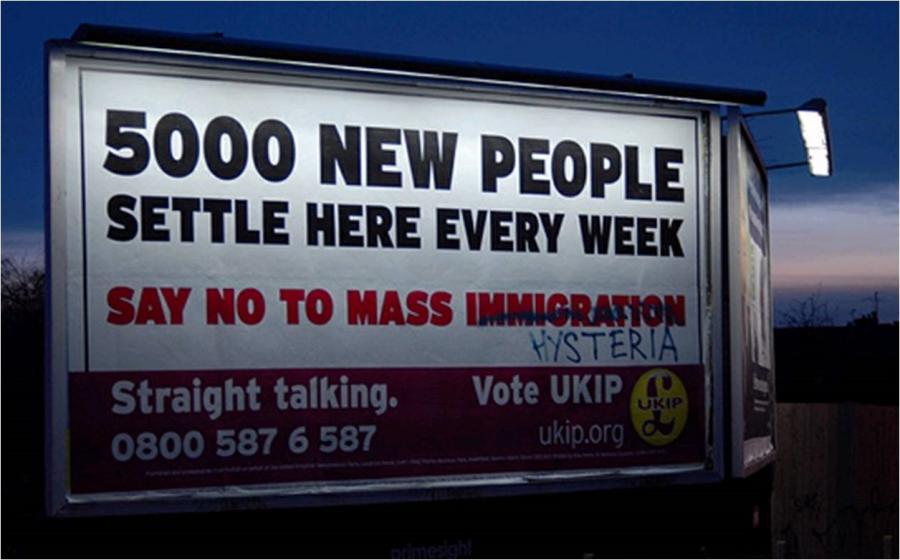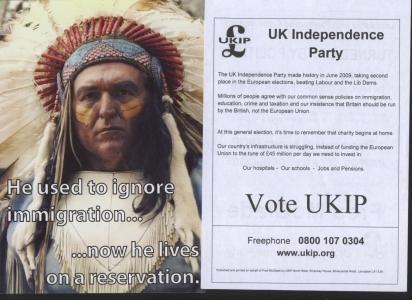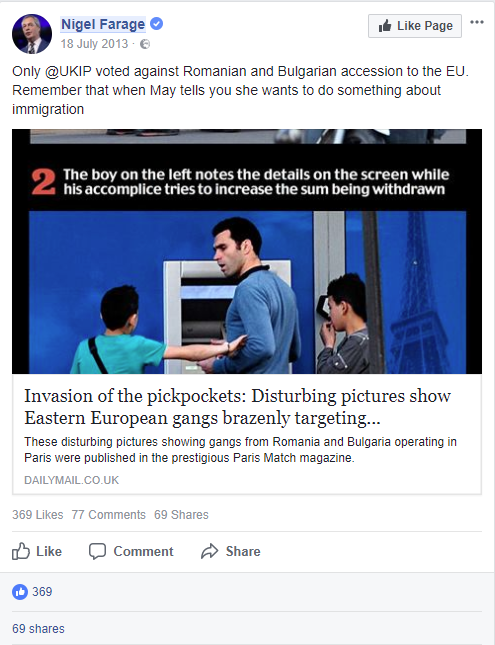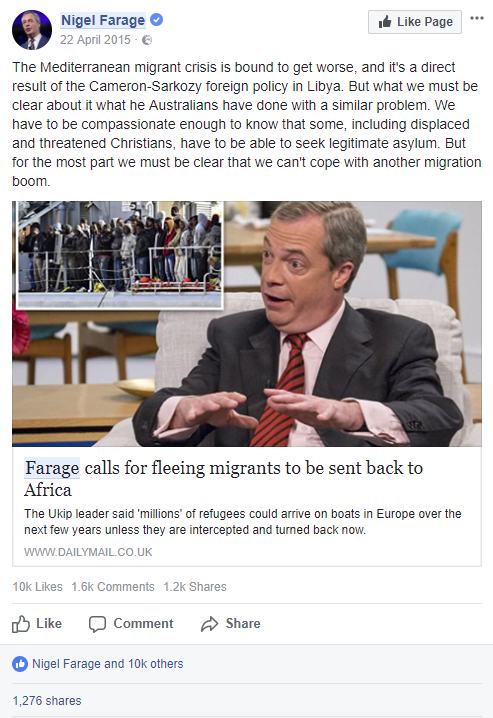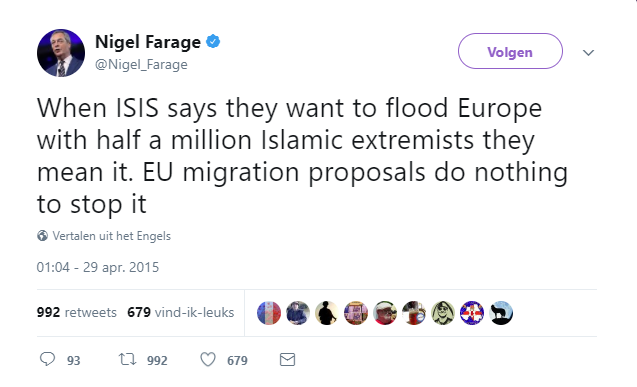
How Nigel Farage speaks about immigration
This article is about Nigel Farage's discourse and tactics regarding UKIP's immigration policy and his own stance on immigration. It discusses the different types of media Farage uses to talk about immigration.
About Nigel Farage
Nigel Farage is the former party leader of the United Kingdom Independence Party (UKIP). In their manifesto for the general elections of 2017, UKIP makes it clear what image they want the public to have of them. The first sentence in the manifesto is as follows: “I have always believed that UKIP is at its best when it is being radical.”. This tells us that UKIP does not believe in being politically correct or considerate. It also shows us that they have a distaste for the elite, preferring to say what they believe a large part of the public thinks, instead of what is considered to be mainstream opinion. They say they believe honesty is the best tactic.
Nigel Farage joined UKIP for the first time in 2006, but left in 2009 so he could become a member of parliament. He lost these elections and joined UKIP again in 2010. Their 2010 manifesto contains their views on a few important issues, including immigration and asylum. They take a rather radical stance, saying that Britain has lost control of its borders.
Immigration policy
In 2010, UKIP proposed certain changes in immigration policy, such as a five-year freeze on immigration for permanent settlement, limiting the number of people that can enter the country, leaving the European Union to regain control of its borders and introducing a points-based system after the five-year freeze, similar to those of Australia, Canada and New-Zealand. People who want to live in the UK will have a trial period of five years and must pass a citizenship test at the end of this trial period. UKIP also wanted to hold asylum seekers in secure and humane centres until their applications were processed, to make sure they could not ‘disappear’. All travellers to the UK would have to obtain a visa from a British Embassy or High Commission. They would also reintroduce the ‘Primary Purpose Rule’. This means that those wishing to marry a British citizen would have to prove that marriage, not residence, is their primary purpose. Finally, UKIP would “end the active promotion of the doctrine of multiculturalism by local and national government and all publicly funded bodies” . This suggests that UKIP believes multiculturalism is a negative thing for Britain and they consider the way the United Kingdom is promoting it a 'doctrine'.
In the early years, Farage mostly used his Facebook account to make fun of other politicians, promote his own appearances on the news or on talk shows and comment on EU policy.
In 2015 elections were held in Britain and the UKIP manifesto from this year shows their more recent stance on immigration. It starts out with a piece written by Nigel Farage himself, in which he says that theirs is the only party that will listen to the voice of the people. He paints UKIP as the only party that represents the will of the people and says the other parties have let Britain down ‘time and time again’ . Immigration is the second issue addressed in the manifesto, suggesting it is still a very important topic for UKIP.
The immigration chapter starts out by saying that migration is one of the greatest issues of our time. According to the manifesto, migration in and out of Britain is at an all time high (298,000 people leaving and entering the country), and frames this as a negative phenomenon. It quickly becomes clear who UKIP blames for this; the government, and particularly the recent Labour governments. It is interesting to highlight the following quote.
“Nearly seven million immigrants came to the UK when the Blair and Brown Labour governments deliberately and recklessly threw open our borders between 1997 and 2010.” Because it is clear from the introduction that UKIP thinks the migration high is a very negative thing for Britain, saying the Labour government opened the borders deliberately and recklessly makes it seem as if the government deliberately destroyed Britain. UKIP frames their party as the only party that can save the UK from destruction.
Comparable to the 2010 manifesto, UKIP wants to regain control of Britain’s borders by leaving the EU. They say they will increase border agency staff and implement ‘new border control technology solutions’ to battle over-staying. They fail to explain what these new border control technology solutions entail. UKIP again mentions an Australian-style points-based system, but, in contrast to the 2010 manifesto, now also explains how this will work in Britain. UKIP wants to install a migration control commission whose job it is to reduce the number of people migrating to the UK.
Interestingly, UKIP says they want to allow people from all nations, not just European people, to enter the United Kingdom under their new visa system. They accuse the government of positive discrimination, favoring European citizens over citizens from other nations. The visa system they propose would offer five categories: work visas, visitor visas and entry passes, student visas, family reunion visas and asylum visas. There would be stricter rules for student visas, checking whether non-UK students are attending classes and which schools are allowed to enroll international students. Family reunion visas would only be granted to those who can prove the primary purpose of their marriage is not to obtain British residency. These changes are similar to the ones they proposed in 2010.
A very important change they would be making is to require all migrants to pay taxes for at least five consecutive years before they would be able to claim UK benefits. This is to battle so called ‘health tourism’, which refers to people coming to the UK to profit from the British heath care system without paying for it.
UKIP’s overall immigration policy has not change much during the years Farage was with UKIP. Their most important policy proposals with regard to immigration would be introducing the Australian points-based system, leaving the European Union, and speeding up asylum procedures.
Figure 1. UKIP election poster
Election Campaigns
In the general election of 2010 UKIP used a couple of posters about immigration to promote their party. Both posters were highly criticized in the news media and by the public. The first poster was the one pictured in Figure 1. UKIP states that 5000 immigrants come to the UK every week, and calls on the public to say no to mass immigration by voting UKIP.
When this poster was vandalized by crossing out the word ‘immigration’ and replacing it with the word ‘hysteria’, this was picked up by the news media and reported about often (figure 2). The person who vandalized it evidently believed UKIP to be the cause for mass hysteria, implying that the immigration UKIP makes out to be a threat, is not as threatening as they would have the public believe.
The second poster UKIP used in their campaign (figure 3) increased the outrage in the media. It depicted a Native American and compared the British struggle with immigration with the Native American struggle with the first Europeans who came to North America. The intended implication is that immigration is a threat to the British way of life, comparable to the threat Europeans posed to Native Americans. By drawing this parallel they once again show they are not afraid to say what they think needs to be said. The use of this poster underlines the way in which UKIP and Farage try to scare the public into voting for them and to want to close the borders. The fate of Native Americans is obviously not a desirable one, and by comparing the current immigration crisis to the Native American struggle, UKIP succeeds in creating a scare.
In their election campaign of 2014 UKIP, led by Farage, used a number of controversial posters again. Farage was campaigning for a BREXIT in 2014, so that is what most posters from this time are about. In one of these posters, the British flag is burned, only to reveal a European flag. This means UKIP believes the European Union is taking over Britain, ultimately allowing no self governance. Apart from the BREXIT posters, UKIP put out one more poster about immigration, which is shown below (Figure 4)
Figure 4. UKIP election poster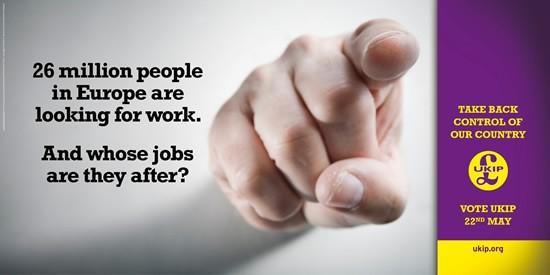
With this poster, UKIP again aims to scare the public. A big hand is pointing at the reader, taking up half the poster's size, which makes it an imposing image. The huge pointing finger is next to an alarming text that says a great number of people in Europe is looking for work and they will come to steal the reader’s job. Apart from a warning about immigration it is also an anti-Europe poster, because the poster suggests these workers come from Europe. Once again readers are invited to wonder whether they will lose their job, and whether their children will have jobs. This is an argument Farage often uses in his discourse, as will be discussed later.
In 2015, UKIP again released a general election poster that got a lot of media attention (Figure 5). The poster in question depicts three big escalators that lead up to the white cliffs of Dover. At the top of the poster the text ‘Immigration is three times higher than the Tories promised’ can be read. With this poster Farage wants to say that instead of putting a limit on immigration, the Tories have thrown open the doors and have even put up metaphorical escalators to make migrating into Britain easier. Farage says he wants to do what the Tories failed to do, according to him.
These posters convey that UKIP is not afraid to say what needs to be said. They are also not afraid to do so in controversial ways. In fact, it seems like UKIP wants their posters to be as controversial as possible so that many people will talk about it and it will be reported about in the news. This way they can increase awareness of their party and its standpoints with minimal effort. A strategy UKIP often employs, as can be observed in a lot of Farage's discourse, is to instill fear. Most posters have the intention to scare readers, so they might vote for the party that claims to be able to save them from the scary prospect of which the posters warn.
Farage and immigration in the Media
In Silverstein (2012) the word 'message' is defined in the context of politics. According to Silverstein, a message can be seen as a politician's public image, consisting of a biography and a moral profile, as relevant to the public. As will be discussed in this section, Nigel Farage's message or image, is that he will be the saviour of Great Britain. According to Farage, he is the only one who recognizes the danger that immigration poses for Western society and the only politician who will do something about this. This message is conveyed largely through fear mongering, using various framing techniques.
Nigel Farage is well known for making controversial and contradicting statements. For example, during a 2014 debate he talked about health care tourism. He claimed that 60.000 of the people who get diagnosed with HIV are not British nationals (the Guardian, October 2014). By choosing this particular disease that many people connect to bad habits and dirty lifestyles, Farage cleverly connects immigrants with HIV and negativity in the minds of his watchers. Once again, the statement caused outrage and got a lot of media attention, which was undoubtedly Farage’s intention.
In March 2014, a very interesting interview took place on Andrew Marr's BBC show (https://www.youtube.com/watch?v=tQ7GrZcPstY&t=275s). Farage uses a clever technique here. He says that he did a tour of the whole of England the previous year and that he had “met people everywhere who said, ‘Nigel, we’ve never had a problem with immigration – it jollifies the place and the food’s better and that’s great- but how many people can we actually take? What chance have our kids got of getting jobs?’”.
This is interesting because by quoting these people that he claims he met, he makes it seem as though what he voices is not just his opinion but that of the common British worker. This technique is often used by other politicians as well. In an analysis of the reasons why Donald Trump became President of the United States, Maly (2016) shows that Trump uses the same technique.
The way Farage frames his message is interesting. He starts out by naming the positive results of immigration ordinary people have experienced (food, jollification), but nullifies them by naming the horrible prospect of seeing your children go jobless. Compared to good food and jolly communities, children without a future are much more important.
By simultaneously applauding immigrants for the positive impacts on communities and blaming them for stealing jobs, the viewer may feel less guilty for agreeing with Farage, because he acknowledges the positive contributions of immigrants as well. Never mind that he does not care much about these positive consequences, compared to the horrible and all-consuming job stealing that these immigrants apparently get up to.
After the first 2015 ISIS terror attack in Paris, we can see a change in Farage’s discourse. Before this he mostly talked about immigration's impact on cheap labour and health tourism. After the attack on Charlie Hebdo in Paris, Farage’s discourse changed to incorporate Islamic extremism (independent, April 2015). According to Maly (2016), a good message is one that aligns with the spirit of the time. In this case, Farage adapted his message about immigration to incorporate the current threats that he says Britain is facing. In March, Farage first mentions a ‘fifth column of Muslim extremists who want to kill us’ (The Guardian, March 2015). By claiming that a fifth column is forming, he says multiculturalism is bad for society, because it leads to separation. This way he addresses the fear people have of a terrorist attack in England. If people are scared of attacks, they will more likely vote for closing their borders.
During a visit to the European Parliament in Strasbourg in 2015, Farage said that the EU asylum policy is a threat to civilisation. He says ISIS is aiming to flood the continent with Islamic extremists and by allowing “large numbers of people from that war-torn region into Europe” it is in danger of losing its civilisation (Independent, April 2015). Farage’s choice of words is interesting again. Instead of saying that allowing Islamic immigrants might result in terrorist attacks, which in itself is a horrible enough prospect, he says that the Islamic immigrants pose a threat to the entire civilisation. By wording it like this, it seems as though this ‘flood’ of people from war-torn regions into Europe will break down the very society we live in. All this fits in with his plan of scaring people into closing Britain’s borders.
Maly (2013) explains what scientific nationalism is. Scientific nationalists are strongly against globalisation, and translate this into a message that frames them as protectors against the dangerous threats of globalisation, such as immigration and Islamisation. Scientific nationalists often use intellectual quotes in their discourse to make it seem as though they are themselves intellectuals and their arguments are based in facts, not just ideology (Maly, 2013). Nigel Farage uses a clever technique that is comparable to this tendency, by using large figures that other people came up with.
In 2016, Farage said that the European Union has allowed 5,000 jihadists into Europe. He quoted the Europol chief, Rob Wainwright on this number. Mr Wainwright himself told Farage that he misquoted him and that what he had said was that 5,000 was the number of European nationals who have been radicalised and travelled to Syria and Iraq (Independent, June 2016). This is a good example of the way in which Farage uses numbers to pretend his points are based on facts, not just on his ideology. He often uses big numbers to make it seem as though these immigrants are flooding the country and taking all the jobs, when in reality the numbers are much smaller.
In 2017 Farage was no longer leader of UKIP, but he did appear on the American news program Fox News to talk about the migration issues in England. After the terror attack in London, in March 2017, Farage appeared on Fox News and claimed that these attacks are the direct result of multiculturalism (Fox News, March 2017). He again claimed that there is a fifth column in European countries, continuing his old discourse.
Farage on Social media
Figure 6. Nigel Farage on Facebook (December 4, 2017)
Nigel Farage is active on Facebook and Twitter. His recent (2017) posts are either about migration, ISIS or Brexit. Usually in the posts he is negative about the current situation in the United Kingdom, praising other countries for their way of dealing with crises or else criticising other countries for their policies. For example, he often posts about Germany's immigration policy (Figure 6). By saying the German immigration policy is bad for Germany, he is showing what he thinks the future of England will be if they keep allowing immigrants into the country.
Nigel Farage first opened his Facebook account in September, 2010, when he joined UKIP. In the early years, he mostly used his Facebook account to make fun of other politicians, promote his own appearances on the news or on talk shows and comment on EU policy. Immigration did not come up often in his early years on Facebook. When he did mention immigration it was to quote other people (Figure 7). Often Farage responded to political news, providing his own opinions, and reminding his fans who had it was who had been warning against immigration from the beginning (Figure 8).
Figure 7. Nigel Farage on Facebook (December 17, 2012)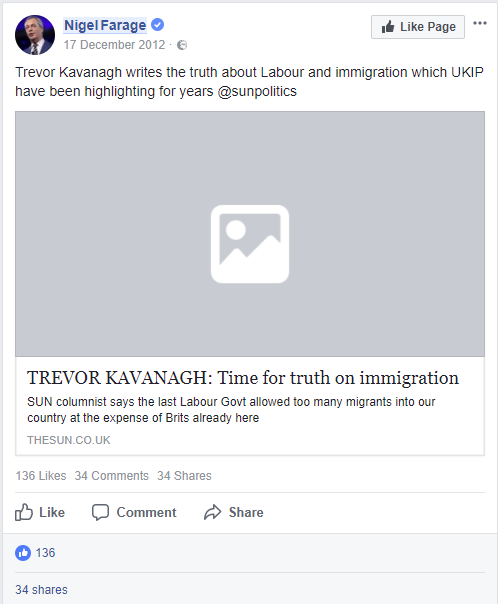
In 2015, Farage started to mention the Australian-style points system he has in mind for the United Kingdom. It is important to note that he was campaigning in 2015 and UKIP's immigration policy was an important topic for a large number of voters. Going into 2015, immigration was mentioned as often as 23 times per month on his Facebook page. Farage addressed current policies and statements from other politicians. These immigration posts are usually about people who come to the UK to find work.
Figure 9. Nigel Farage on Facebook (April 22, 2015)
Stopping refugees from entering the country also becomes a part of his discourse in 2015 (Figure 9). Before this, Nigel Farage mostly talked about illegal workers, mostly from EU countries but also from outside the EU, who came to work in England. In 2015 he started commenting on the migrant crisis as well, and this continued into 2016. Farage blamed the European Union for the migrant crisis and the illegal workers and says England has to regain control of its borders.
Figure 10. Nigel Farage on Twitter (April 29, 2015)
On Twitter, Farage uses much the same discourse as on Facebook. He uses his account to react to other politicians who have commented on migration, quotes articles and people who talk about migration, and promotes his own views on the matter. Before 2015 he mostly talked about workers coming to the UK, but since 2015 he has also incorporated ISIS, terrorism and refugees into his discourse (Figure 10).
Ukip, Farage and anti-migration
Overall, we can see that UKIP under Farage is very much against immigration and multiculturalism. It continuously advocates closing the borders or regaining control over them, by leaving the European Union. Often, inflated numbers are used to scare voters about immigration and Islamic extremists (Independent, June 2016). Farage often says that there is a fifth column in Britain of people who want to hurt its civilisation and people (The Guardian, March 2015). He uses framing and tricks to make people believe he speaks for the common man (BBC, March 2014), when in reality he is only advocating his own beliefs.
References
Bartlett, E., & Cooper, C. (June 8, 2016). Europol chief tells Nigel Farage to stop misquoting him with ‘false and alarmist’ claim of 5,000 Isis jihadists in Europe. The Independent.
Mason, R. (March 12, 2015). Nigel Farage: British Muslim ‘fifth column’ fuels fear of immigration. The Guardian.
Stone, J. (April 29, 2015). EU asylum policy is ‘a direct threat to our civilisation’, says Nigel Farage. The Independent.
Lempert, M., & Silverstein, M. (2012). Creatures of politics: Media, message, and the American presidency. Indiana University Press.
N.A. (March 22, 2017). Farage: Anti-Travel Ban Protesters Need to Reflect on London Terror Attack. Fox News.
N.A. (March 2, 2014). Nigel Farage on The Andre Marr Show 2-March-2014. The BBC. Retrieved from: https://www.youtube.com
Maly, I. (2016). Why Trump Won. Academia. Retrieved from www.academia.edu
Maly, I. (2013). 'Scientific nationalism': N-VA, banal nationalism and the battle for the Flemish nation. Tilburg Papers in Culture Studies, 63, 1-16.

